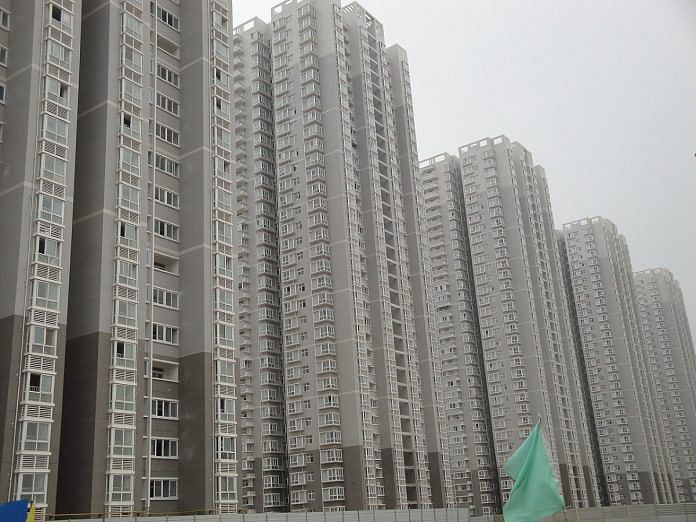China’s economy is slowing down because population growth has slowed down much faster than one would have imagined. As a result, demand has dipped and among the sectors bearing the brunt of this is the Chinese housing market.
Important to note though that China’s economy is not collapsing, what seems to be collapsing is the Chinese real estate sector and the housing market in particular, which contributes tremendously to the Chinese economy — much more than it does in India.
This might also be a function of how quickly China’s gross domestic product (GDP) has grown and how many people have become richer to the extent of having surplus cash to buy homes for themselves. China grew much faster than India in the last 30 years, leading to an increase in the demand for housing, as many wished to move into better houses.
Also, millions of Chinese who previously resided in villages, moved to cities which led to a real estate boom. At its peak, real estate came to contribute more than 30 percent of China’s GDP. In comparison, the contribution of India’s real estate market to the overall economy ranges between 6-7 percent.
Before proceeding any further, it is important to talk about three of China’s biggest real estate and asset management companies, one of which is Evergrande. About two years ago, in December 2021, Evergrande defaulted on its international bond repayments. This was the first sign that a crisis was brewing in China’s real estate sector.
The second of the three companies is Country Garden, among the biggest real estate developers in China, which too defaulted on its international debt payments. Interesting to note is that Yang Huiyan, its chairperson, was ranked the richest woman in Asia in 2021. The company, which has an estimated 3,100 housing projects across China, saw its market cap shrink from a peak of $50 billion in 2018 to $3.5 billion in August this year.
Finally, there is Zhongzhi. Founded in 1995 by Xie Zhikun, who once worked for a printing press, Zhongzhi is not a real estate company but rather a major lender to the sector. It is a prominent player in what is known as China’s ‘shadow banking’ industry.
In simple terms, ‘shadow banking’ refers to a system of financial institutions which take deposits and give out loans without due diligence otherwise required by law. The size of China’s ‘shadow banking’ sector is estimated to be around $3 trillion — nearly the size of the French economy.
Zhongzhi too has now defaulted on its repayments, issuing a statement acknowledging a shortfall of $36.7 billion in its balance sheet. Following the death of its founder in 2021, Zhongzhi saw the exit of many key employees and this subsequently resulted in the company declaring ‘insolvency’. It has been in the news this past week because two senior executives of companies linked to Zhongzhi seem to have gone missing.
Also Read: Synthetic drug ‘50 times more potent than heroin’ — why fentanyl figured in Biden-Xi meet
Rotten tails & mortgage boycotts
This brings us to the bigger question. As many 20 million households in China are waiting to take delivery of apartments for which they have already paid by borrowing from ‘shadow banking’ organisations or NBFCs. A similar problem exists in India. By some estimates, nearly 4.8 lakh homes are under stress in India, compared to the 20 million in China.
In the case of China, there are two terms that are key to understanding the housing crisis: ‘rotten tails’ and mortgage boycotts.
The phrase ‘rotten tails’ is the exact translation of a Chinese expression and is now being used to describe apartment buildings or projects where the structure has been erected, but the building itself is still not liveable. These projects remain stalled for a number of reasons, ranging from the builder running short of funds to homebuyers being duped.
Against this backdrop, homebuyers are forced to think why they should keep paying back their lenders for a sum they borrowed to pay for homes they can’t inhabit.
As a consequence, many Chinese homebuyers are now carrying out a mortgage boycott.
To counter this problem, the People’s Bank of China pledged $77 billion, besides offering interest-free loans, provided that this money is lent to the ‘shadow banking’ industry which was financing the real estate market.
However, the banks seem uninterested, because they recognise that the monkey of defaults is being shifted from the backs of the real estate developers and ‘shadow banking’ industry, only to be placed on their backs.
This is the edited transcript of ThePrint CutTheClutter Episode 1363, published on 7 December 2023, on China’s real estate crisis & ‘shadow banking’ sector.
Also Read: Threat for India, advantage China — what Thai PM’s ‘doodle’ at BRI Forum signifies for the 2 nations



